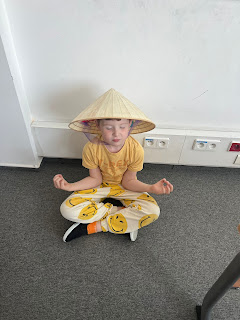My reflection
My reflection
Every day we encounter a different version of ourselves and our students. In the words of the Greek philosopher Heraclitus, ‘No man ever steps in the same river twice, for it's not the same river and he's not the same man’. In this process of change, reflection allows us to learn and grow, personally and professionally. So I consider that the teaching practice becomes a constantly changing journey, where reflection is present and generates action and change, as if it were a cycle constantly repeating itself at different times (Kemmis and McTaggart, 1988).
As a result, I understood the importance of research in teaching. Through my experience, I can say that I am a person who allows myself to get to know my students and I try to give each one what he or she needs, constantly reflecting on what happens in the class and after the class. Often we are more concerned with reaching the objectives of the class that we forget that certain strategies may or may not work, so being prepared to solve problems on the fly becomes an indispensable task, always in action. Burns (2010), mentions that a teacher's action research work is a process that includes self-reflection to explore their teaching practice.
The self reflecting in and on action by Schön (1983), it has helped me to realize many things, among them, that my students are a reflection of my practice and that many times, what I think is not working is a reflection of my own insecurities in the classroom for example; I thought that teamwork in my classroom was not possible because most of them wanted to work only with their friends and not participate with the rest of their classmates, the response was of dislike and apathy for the activity, where my students presented physical emotional reactions. Through reflection I got to know that it was partly about me and how the group dynamics were affected, where I lost control and management of the situation was difficult to manage.
I understood that there is necessary to set strategies to improve such practice, that it was ok to lose the control and trust my students, set visual timers, allow them to make their own groups sometimes and some other times group them randomly, gave them more time for speaking, I realize that these strategies were necessarily for a cooperative learning (Jo Bertrand 2024; Johnson, Johnson, & Holubec, 2013).
In conclusion, through this journey I have understood the importance of reflection to grow professionally. Every time we question something, we get closer to a new and improved version of ourselves, where our students are the reflection of our professional effort. The learning process is a partnership in which both students and teachers learn from each other simultaneously.
References
Burns, A. (2010). Doing Action Research in Language Teaching: A Guide for Practitioners. NY: Routledge. Jo Bertrand. The advantages of pair work and small group work. Retrieved May 18, 2024. https://www.teachingenglish.org.uk/teaching-resources/teaching-primary/activities/level-1/working-pairs-and-groups
Johnson, D. W., Johnson, R. T., & Holubec, E. J. (2013). Cooperation in the Classroom (9th ed.). Edina, MN: Interaction Book Company.
Kemmis, S., & McTaggart, R. (Eds.). (1988). The action research planner. 3rd edition. Geelong: Deakin University Press.
Schön, D. A. (1983). The reflective practitioner: How professionals think in action. New York: Basic Books.


Comments
Post a Comment